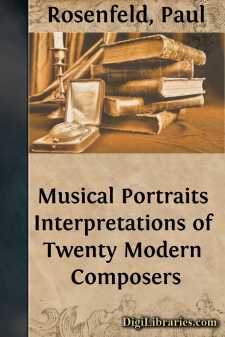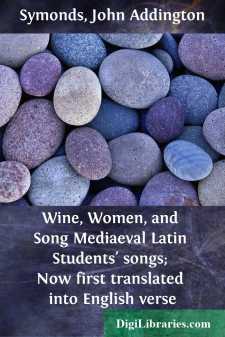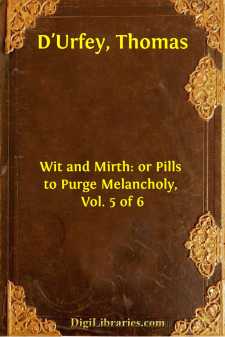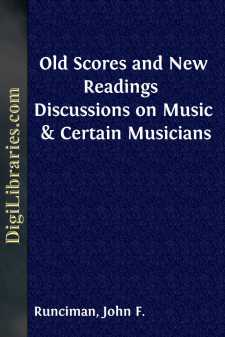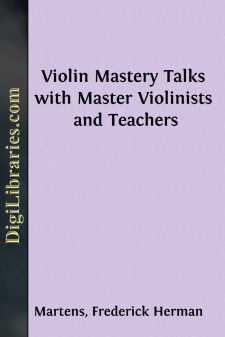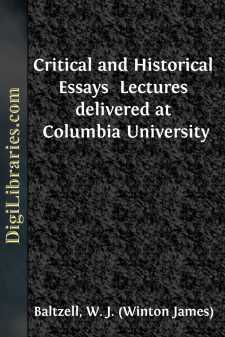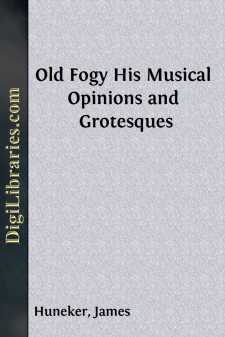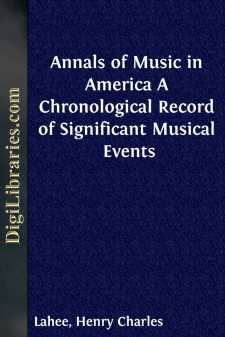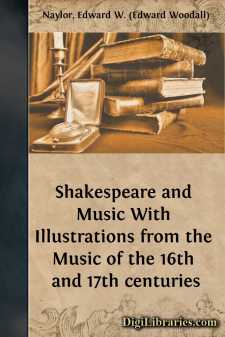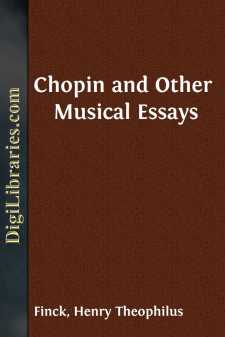Music
Music Books
Sort by:
by:
Paul Rosenfeld
Wagner Wagner's music, more than any other, is the sign and symbol of the nineteenth century. The men to whom it was disclosed, and who first sought to refuse, and then accepted it, passionately, without reservations, found in it their truth. It came to their ears as the sound of their own voices. It was the common, the universal tongue. Not alone on Germany, not alone on Europe, but on every...
more...
I. When we try to picture to ourselves the intellectual and moral state of Europe in the Middle Ages, some fixed and almost stereotyped ideas immediately suggest themselves. We think of the nations immersed in a gross mental lethargy; passively witnessing the gradual extinction of arts and sciences which Greece and Rome had splendidly inaugurated; allowing libraries and monuments of antique...
more...
by:
Thomas D'Urfey
By Sir John Burtonhead. [Listen] LL Christians and Lay-Elders too,For Shame amend your Lives;I’ll tell you of a Dog-trick now,Which much concerns you Wives:An Elder’s Maid near Temple-Bar,(Ah! what a Quean was she?)Did take an ugly Mastiff Cur,Where Christians use to be.Help House of Commons, House of Peers,Oh now or never help!Th’ Assembly hath not sat Four Years,Yet hath brought forth a...
more...
by:
John F. Runciman
Many years ago, in the essay which is set second in this collection, I wrote (speaking of the early English composers) that "at length the first great wave of music culminated in the works of Tallis and Byrde ... Byrde is infinitely greater than Tallis, and seems worthy indeed to stand beside Palestrina." Generally one modifies one's opinions as one grows older; very often it is necessary...
more...
EUGÈNE YSAYE THE TOOLS OF VIOLIN MASTERY Who is there among contemporary masters of the violin whose name stands for more at the present time than that of the great Belgian artist, his "extraordinary temperamental power as an interpreter" enhanced by a hundred and one special gifts of tone and technic, gifts often alluded to by his admiring colleagues? For Ysaye is the greatest exponent of...
more...
CRITICAL AND HISTORICAL ESSAYS Darwin's theory that music had its origin “in the sounds made by the half-human progenitors of man during the season of courtship” seems for many reasons to be inadequate and untenable. A much more plausible explanation, it seems to me, is to be found in the theory of Theophrastus, in which the origin of music is attributed to the whole range of human emotion....
more...
by:
James Huneker
INTRODUCTION My friend the publisher has asked me to tell you what I know about Old Fogy, whose letters aroused much curiosity and comment when they appeared from time to time in the columns of The Etude. I confess I do this rather unwillingly. When I attempted to assemble my memories of the eccentric and irascible musician I found that, despite his enormous volubility and surface-frankness, the old...
more...
1640-1750 The Annals of Music in America during the first hundred years contain very little that would seem to be of any importance to the musicians of today. Nevertheless it is as interesting to note the beginnings of music in this newly settled country as to watch the appearance of the baby's first tooth. The first settlement at Plymouth took place in 1620, and we find that in 1640 the colonists...
more...
DESCRIPTION OF FRONTISPIECE [I am indebted for the arrangement of this picture to the kindness of the authorities at South Kensington Museum, where all these instruments may be found, except the Pipe and Cornet, which belong to my friend, Mr W.F.H. Blandford.] In the middle, on table. Queen Elizabeth's 'Virginal.' Date, latter half of 16th century. Outside of case (not visible in...
more...
I CHOPIN THE GREATEST GENIUS OF THE PIANOFORTE Leipsic, the centre of the world's music trade, exports about one hundred thousand dollars' worth of music to America every year. I do not know how much of this sum is to be placed to the account of Chopin, but a leading music dealer in New York told me that he sold three times as many of Chopin's compositions as of any other romantic or...
more...


